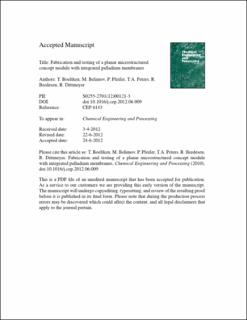Fabrication and testing of a planar microstructured concept module with integrated palladium membranes
Peer reviewed, Journal article
Accepted version
Permanent lenke
https://hdl.handle.net/11250/2720491Utgivelsesdato
2013Metadata
Vis full innførselSamlinger
- Publikasjoner fra CRIStin - SINTEF AS [5801]
- SINTEF Industri [1565]
Sammendrag
A planar microstructured hydrogen separation module has been fabricated to study the hydrogen permeation through free-standing palladium-based membranes (Pd, PdCu and PdAg) with minimal influence by concentration polarization. The membranes were laser-welded directly between two face-to-face arranged stainless-steel sheets with 10 microchannels each (width × depth × length of the channels: 500 μm × 300 μm × 2 cm). Single gas hydrogen and mixed gas permeation experiments (H2/N2) were conducted between 300 and 400 °C. The permeabilities and activation energies of the membranes in this temperature range were calculated. The 12.5 μm thick membrane was successfully tested up to 650 kPa, indicating that the microchannel plates provide a good mechanical support even for very thin membranes. However, settling of the film into the microchannels on the permeate side was observed due to the overpressure on the retentate side suggesting even finer channels and eventually the use of an additional porous support for very high differential pressure. The concentration polarization effects in the membrane module were evaluated in terms of the film effectiveness factor η which is a familiar concept from heterogeneous catalysis. It could be shown that the microchannel configuration effectively decreases concentration polarization.

